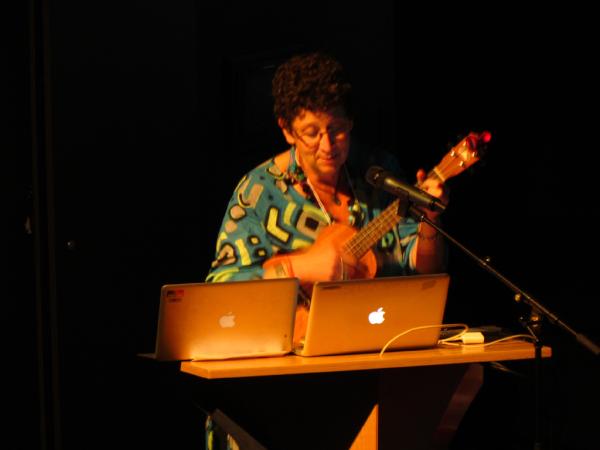@speakwhen caught an image of me Friday morning when I promoted the NorthernVoice‘s Open Space — a.k.a. Moosecamp… with an improvised Uke song. My first public Uke performance. It was fitting, since later in the day Alan Levine, Rob Cottingham and I ran a session on improv. I’m still running a mile a minute with draft blog posts from the adventures of the last two months, but hey, a quick picture and a link to the audio from @felicelam will have to do for now! Nothing like jumping off the cliff of risk! (And to discover KDot does a weekly #UkeTuesday post!!) I guess this was my UkeFriday! Thank you friends and NorthernVoice!!
RossViz is Just Around the Corner
The early bird deadline is past, but we are sending out the word at a couple of F2F workshops in the next few weeks and I want this post findable on my (messy, messy) blog. The time to commit is NOW! I learned so many new things this year that I want to share. I want to learn from y’all. The folks who have signed up so far are fascinating and a few are far flung! So expect great, diverse interactions. We have a few more spaces available so MAKE YOUR MOVE!
Once again, here are the details:
Michelle Laurie and I are excited to announce the 3rd annual graphic facilitation workshop (aka Rosviz!) in beautiful Rossland, BC, Canada, July 18-20th, 2012. We had so much fun at #1 and #2, we are going for #3! (See Sylvia’s great video from #2 here.)
You are invited to this experiential workshop which takes place almost entirely at the drawing surface!
We’ll start the evening of July18th by warming up our drawing muscles and silencing those pesky inner censors. The second day, we’ll build into the basic practices of graphic facilitation and recording. We will pay attention to preparation, the actual visual work, and follow up including digital capture of paper based images. Our third day will be devoted to participatory graphic approaches, practicing and giving peer feedback. You can expect to go away with icons, ideas and approaches which you can use immediately, as well as ideas about how to hone your practice.
When might we use this practice?
Sometimes our imaginations are sparked by a visual where words fail us. Think about when communities plan and imagine their futures, when teams consider the possible outcomes for their projects, when groups create maps to track their progress. These are all opportunities to use visuals to engage and deepen community dialogue. You can use visual thinking to improve teamwork, communications, meetings, build engagement and to plan work. Step out of the PowerPoint rut!
Who should attend?
Facilitators, project managers, team leaders and members, town planners, teachers and anyone who would like to engage others beyond words.Please Note: You do NOT need previous experience or have to consider yourself an artist. At some level, we can all draw and use visuals to enhance our communications and engage diverse audiences.
Quick details: Michelle will be hosting and we’ll both be co-facilitating. This 2.5 day workshop begins the evening of Wednesday, July 18th and ends mid-afternoon on Friday, July 20th. Pricing is CA $840.00 thereafter. (US Friends — it is about the same in dollars! If you have/want to pay in dollars, I can take those. NW) Email Michelle to register: michelle.k.laurie(@)gmail.com.
via Workshop Alert – Rosviz is back! | Michelle Laurie rants and raves.
The Real Work — Wendell Berry
 Just back from Bhutan, my mind and heart are full, and my mind is tripping forward to the next work that is flowing towards me. One is a collaborative session on improvisation at Northern Voice in a couple of weeks. This poem speaks both to the last 16 days in Bhutan and the upcoming collaboration. A bit of kismet that it floated in front of me, courtesy of Jerry Michalski. A little Saturday morning gift. I promise a post about Bhutan in the coming week.
Just back from Bhutan, my mind and heart are full, and my mind is tripping forward to the next work that is flowing towards me. One is a collaborative session on improvisation at Northern Voice in a couple of weeks. This poem speaks both to the last 16 days in Bhutan and the upcoming collaboration. A bit of kismet that it floated in front of me, courtesy of Jerry Michalski. A little Saturday morning gift. I promise a post about Bhutan in the coming week.
The Real Work
It may be that when we no longer know what to do
we have come to our real work,
and that when we no longer know which way to go
we have come to our real journey.
The mind that is not baffled is not employed.
The impeded stream is the one that sings.
~ Wendell Berry ~
(Collected Poems)
Affection: must share from Wendell Berry
 This morning from an #agchat tweet I spotted the word “affection.” I had to click. (Thanks @USFarmerMag!) And found this from March. Take a minute and enjoy. ( I read it while listening to Rene Fleming with YoYo Ma, Edgar Meyer and Chris Thile creating music with “Touch the Hand of Love.” Mama mia. Great combo. I’ll embed it below so you can do the same if you wish.)
This morning from an #agchat tweet I spotted the word “affection.” I had to click. (Thanks @USFarmerMag!) And found this from March. Take a minute and enjoy. ( I read it while listening to Rene Fleming with YoYo Ma, Edgar Meyer and Chris Thile creating music with “Touch the Hand of Love.” Mama mia. Great combo. I’ll embed it below so you can do the same if you wish.)
For the 41st Jefferson Lecture in the Humanities which he delivered on Monday evening at the Kennedy Center, Mr. Berry, American intellectual and agrarian-minded elder, described how and why affection, yes, affection!, ought be considered the cornerstone of a new economy. Berry tells us that affection does not spring up fully formed; it is gotten to by way of imagination. It’s a train of thought worth quoting at length: “For humans to have a responsible relationship to the world,” says Berry, “they must imagine their places in it. To have a place, to live and belong in a place, to live from a place without destroying it, we must imagine it. By imagination we see it illuminated by its own unique character and by our love for it. By imagination we recognize with sympathy the fellow members, human and nonhuman, with whom we share our place. By that local experience we see the need to grant a sort of preemptive sympathy to all the fellow members, the neighbors, with whom we share the world. As imagination enables sympathy, sympathy enables affection. And it is in affection that we find the possibility of a neighborly, kind, and conserving economy.” Affection, then, takes us beyond statistics and generalizations to the immediate and the particular. It focuses our attention on the beloved things right in front of us. This field,this child, this community.
Berry observes that we live in a time where affection is discounted. It’s true: rare is the public discussion where affection – or beauty, or hope, or joy – is brought forward as a good and weighty reason to do anything. But Berry believes that affection is deeply motivating. “Affection involves us entirely,” he writes. If he is right, love itself could be what moves us, finally, to care for the Earth.
You can read Wendell Berry’s Jefferson Lecture, or watch a video of him delivering it.
via LocalHarvest News – March 30, 2012.
I loved this line: “affection does not spring up fully formed; it is gotten to by way of imagination.” As I prepare to facilitate an agricultural planning meeting, this is so useful for me to have in my mind.
Where are you imagining and nurturing affection in your work? Your life? Who is imagining it for you?
Tree image from Flickr, License![]()
![]()
![]() Some rights reserved by Frodrig
Some rights reserved by Frodrig
CPsquare’s NING Stackathon – Tech Stewarding Learning Opportunity!
Are you stewarding technology for your community? Did you or are you considering a NING site? You may want to join in with CPSquare’s NING Stackathon. It will last for a year, but I suggest you get in on the ground floor now. John notes at the bottom that if you are willing to contribute a case, he will waive the (VERY MODEST) entry fee. Plus you get a six month CPSquare membership. Folks, JUMP on this!
Here are the deets, via http://cpsquare.org/.
By: John David Smith
Hackathons are the current equivalent of a barn-raising, where people get together and work really hard for a short period of time on a fun project that somehow contributes to the common good. We’ve used barn-raising as examples of the kind of personal, skin-in-the-game generosity that’s involved in communities of practice.
We’re inventing a new portmanteau. A Stackathon is working party that’s slower-paced than a hackathon and more reflective. It gathers useful examples of something with a lot of sense-making built into the process. Therefore a stackathon is not like the current craze for content curation. Read on for details about CPsquare’s first Stackathon.
During this stackathon we’ll gather profiles and portraits of as many living Ning-based or Ning-supported communities as possible. We’ve started developing a list of interesting examples. As we stack these communities one on top of another, we expect to discover new hacks that could make any of them more effective, sustainable, and fun. (And those hacks are probably relevant to simpler or more elaborate platforms than Ning, too!)
We will try to be somewhat systematic in describing how Ning is configured for each community and how it fits in the community’s digital habitat. We’ll pay attention to the ongoing role of leadership, facilitation, and technology stewardship. That means understanding what the community is about, what kinds of activities are typical, and what other tools a community uses in each community. Understanding that would give us a better idea of how and when to recommend Ning. Our stack will also suggest many possible methods that one community could borrow from another (including the use of auxiliary tools, plug-ins, themes, membership restrictions, etc., etc.).
During the stackathon (which will run for a whole year, from March 2012 to April 2013) we’ll have discussions in CPsquare’s Web Crossing site (password required: it’s for CPsquare members and people registered for the Stackathon), we’ll collect ideas in various Google Docs, we may have teleconferences, and we will collect some of our insights on CPsquare’s Media Wiki site. It all depends on what people want to do and are willing to do.
You can participate in the stackathon by joining CPsquare or by registering for the Stackathon here (costs $10). Any Stackathon registrant who contributes a full community portrait gets their registration fee refunded and they receive a CPsquare membership during the last 6-months of the Ning Stackathon.
(Thanks to Amboo Who for the photo!)

